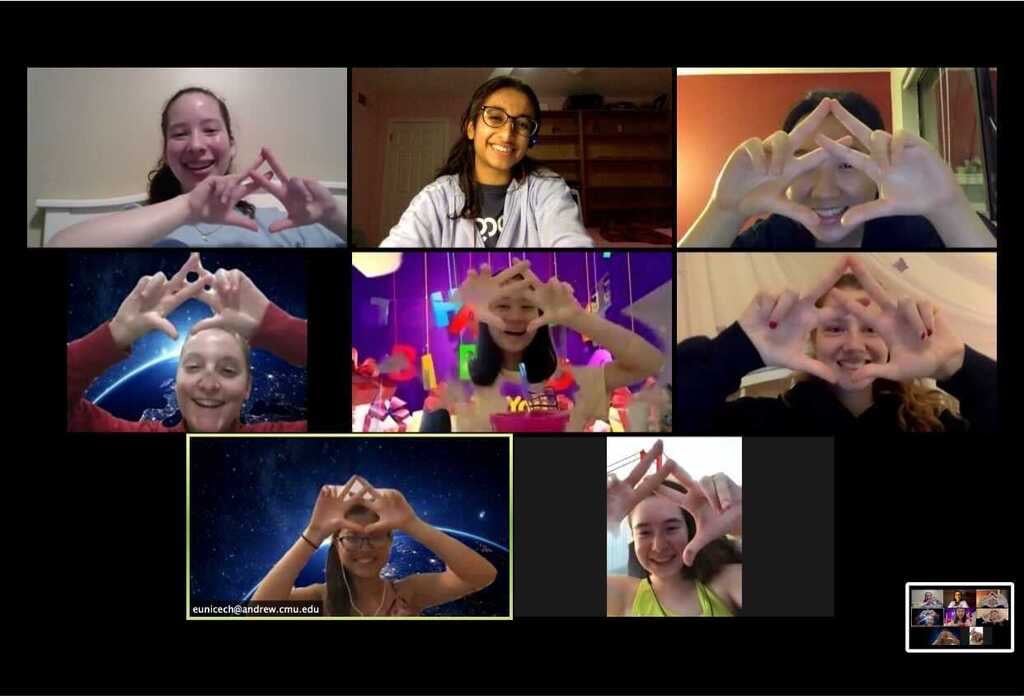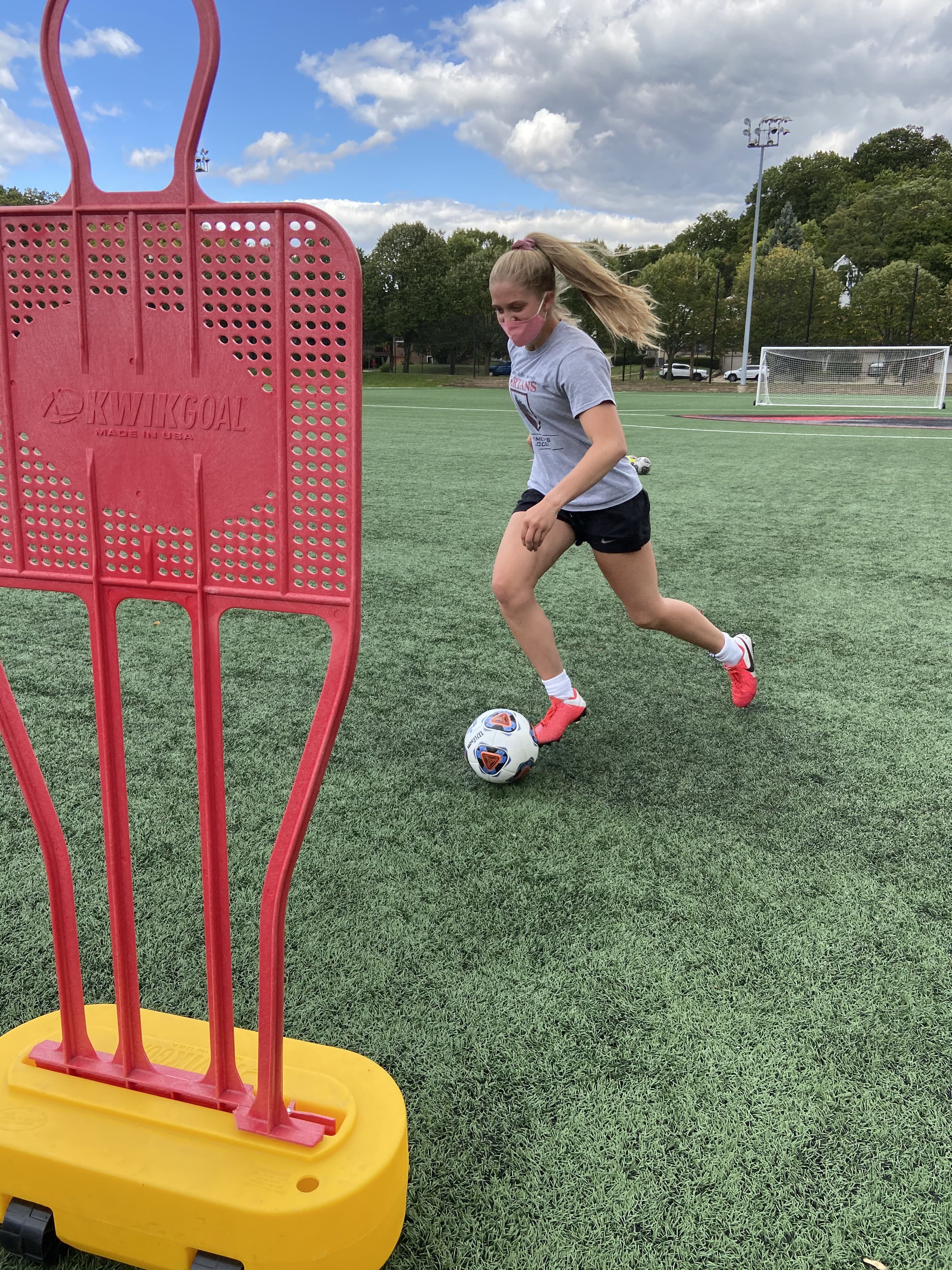Fostering Community Through COVID
CMU student organizations adapt to pandemic safety precautions
Carnegie Mellon University students and faculty are engaging with campus remotely this year, and those on campus are navigating strict physical distancing protocols. CMU students are nothing if not resourceful and optimistic, finding creative ways to enjoy their extra-curricular activities while building a sense of camaraderie. Student groups have innovated and adapted to operate during the pandemic.
Staying Focused on the Future
A year ago, the Tartan women’s soccer team was preparing to compete in the Final Four, the National Championship for Division III colleges and universities. Today, they’re working on individual fitness and foundational skills.
"We broke the team down into small groups based on their class schedules, so we can keep them really distanced and work on technical skills and individual player development," said Head Coach Yon Struble. "Everyone was fully intent on finding ways to get back together as a team, in any way possible."
Rather than focus on what they cannot do this year, Struble and the team are looking to next year, when they are again able to compete against other teams. Struble said this is a team that knows how to be successful. "Our mantra is, 'Where do you want to be a year from now and what can we do to get ready for that?'" Struble said.
Team captains Madison Lui and Jocelyn Mayer are adjusting to new health and safety regulations. Rest periods in between exercises are now spent cleaning equipment with sanitizing wipes, and instead of going up against one another on the field, the players attack training opponent mannequins they’ve nicknamed "Tom."
While the Tartans are not competing against other schools this year, this group of athletes is still finding ways to nurture that competitive spirit. "Our mindset is that we are competing against ourselves to do our best," said Lui. The team has a point system rewarding individual’s skills or sprint times, and every practice session ends with the coach announcing the latest tally.
"At the end of the season, we will name the most competitive player," said Lui. "We want to get better every single day."
A few years ago, the team created an assistant captain position meant to nurture the rookies and make sure they felt included. This year, Rachel Legg serves in that role, which has taken on a new importance. Legg might not see the rookies in person regularly unless they are scheduled into her training time slot, but she checks in regularly via Zoom or text message to see how everyone is acclimating. Legg and the coaching staff helped make sure all the first-year players secured housing off campus so they would be able to participate in person for the entire academic year.
Mayer said, "We know we are so fortunate to have this opportunity to be in person, that it’s a privilege to be able to train together. We are all trying to make the most of it."
Lui said she has felt a great sense of camaraderie with the entire CMU community since she returned to Pittsburgh this fall. "I do get a sense that we are all going through this shared, awkward experience together," she said.
The Originals, CMU's male-identified a capella group, accepted online auditons for the first time in the fall of 2020. They prepared a promotional video highlighting performances from previous years.
Build on the Basics
For the first time ever, The Originals — CMU's male-identified a cappella group — accepted video auditions. Tucker Helms, artistic director, prepared a series of scale exercises so he could assess vocal range and then he asked for a 90-second performance of a song, plus any other skills applicants wanted to show off.
Helms explained that a video audition is a very different type of stress for a performer, who has unlimited time to focus on each second of the recording. "You’re in there judging yourself and trying to figure out your best take," he said.
But, for the foreseeable future, individuals singing into video equipment is the safest way forward. "It’s a tough environment," said Helms, who added that he misses the special experience performers have with a live audience and with one another on stage.
The Originals, or The O's for short, usually rehearse seven hours a week, but have cut back. "We do all our own arrangements and are really focusing on preparing new music," Helms said. During Zoom rehearsals, performers go into breakout rooms based on voice part. To avoid sound lag, the O's take turns going on mute.
"You can still practice listening and singing with somebody else — they just can’t hear you," Helms said. "We are figuring it out right now."
Helms has been very encouraged by performers he’s seen from around the world, creating art individually and in isolation. “A lot of artists have dropped albums during the pandemic. We have made a lot of amazing music in the past two years but have been moving at such a fast pace ... this is a chance for us to sit down and get a sense of who we are."
The fast pace Helms referenced is The O's performance at the 2019 International Championship of Collegiate A Cappella competition, where the group placed fourth in the world. The O's also released an album called Blue Rose that year. "One of the ways I’ve stayed encouraged is to go back to bare bones, fundamentals of music," said Helms.
He and the group hope to share new music by the end of the year.
For now, fans can support The O’s in a virtual competition pitting their pre-recorded video against videos from other groups around the world. The winning a cappella group earns $10,000 for a social justice charity of their choice. The O's have named the Lebanese Red Cross as their charity for their relief efforts following the explosions in Beirut.
Socially Distanced Sisterhood
For many women, the opportunity to join a sorority is a core part of the college experience. Sara Diem, coordinator of SLICE and advisor to the Panhellenic Council, is proud to say that the Panhellenic Council at CMU, and Greek Life in general at the university, is taking COVID precautions as seriously as their desire to maintain connection and offer programming this academic year.
"I think our students at CMU are especially self-aware and recognize that having some form of our traditions requires everyone’s participation to make our community safer," said Diem.
The Panhellenic Council, which governs six sorority chapters on campus, has moved all of their structured traditions into a virtual arena. "We’re seeing students getting really creative about what they can do," Diem said. Over the past six months, Diem has observed students exploring book clubs, dance parties and virtual recruitment events.
Elektra Petrakis, student president of the Panhellenic Council, has devoted hours, along with chapter leadership, to planning a safe recruitment experience that still offers new students an opportunity to get to know the members of each sorority.
Breakout rooms in the virtual environment enable remote students in different time zones to fully participate and allow for things like identity-focused conversations.
Petrakis joined a sorority in her first year, wanting to meet people in other majors and build connections with women who have different perspectives from her. Figuring out a way to safely plant the seeds for that friendship was challenging. "We started thinking about it back in January," she said, when news of the pandemic first began to circulate.
The Panhellenic Council brought up the idea of virtual coffee dates, pairing upper-class students with first-year students looking to join a sorority. "We thought maybe 10 people would take us up on it," Petrakis said.
To date, Diem said there have been over 50 of these intentional conversations. "Incoming students really seek that mentorship that typically exists within a fraternity or sorority, to learn more about the class work and what it means to balance a pretty significant time commitment with a rigorous academic program," Diem said.

Members of the Alpha Chi Omega sorority connect with one another virtually during their weekly executive board meetings.
Petrakis noticed that even the upper-class students have found some benefit in the virtual Greek Life model. Chapter meetings are typically all business, but now the sororities have had more time to build relationships through fun activities.
Recently, Petrakis participated in a do-it-yourself face mask party, where chapter leadership posted a recipe for a skincare product the members then all made together over Zoom. "We are really focusing on self-care and care for one another," Petrakis said, noting that members are checking in with each other frequently to try to quickly identify if anyone is struggling.
"My sorority has always been a one-stop shop for me for every type of interpersonal relationship I value," she said, referring to support in her classes, in her personal life and as a social outlet from her coursework. "The women I've met in Greek Life are really invested in building relationships and creating friendships, and that's still happening. It's just happening differently."
